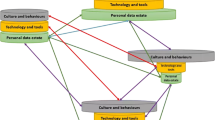Abstract
Positionality refers to the individual social and political context that creates a person’s identity, e.g., race, class, gender, sexuality, ability, status, and how such markers influence the stance people take, or what they can access, in society. In a postdigital era, it becomes necessary to expand these markers of people’s positions to include numerous effects and potential bias from data-driven systems and related discourse that now fluidly interact with people’s positions. Postdigital positionality is a concept that develops former theoretical framings of positionality, to reflexively acknowledge a complex interplay of new postdigital knowledge ecologies, now intersecting with human identity.
Similar content being viewed by others
References
Alcott, L. (1988). Cultural Feminism Versus Post-Structuralism: The Identity Crisis in Feminist Theory. Signs, 13(3), 405-436. https://doi.org/10.1086/494426.
Carter, G., & Legleitner, R. A. (2021). Prioritizing Ourselves and Our Values: Intersectionality, Positionality, and Dismantling the Neoliberal University System. Academic Labor: Research and Artistry, 5(1), 1.
Crenshaw, K. W. (2017). On intersectionality: Essential writings. New York: The New Press.
Day, S. (2012). A Reflexive Lens: Exploring Dilemmas of Qualitative Methodology Through the Concept of Reflexivity. Qualitative Sociology Review, 8(1), 60–85. https://doi.org/10.18778/1733-8077.8.1.04.
Hayes, S. (2019). The Labour of Words in Higher Education: Is it Time to Reoccupy Policy? Leiden: Brill.
Hayes, S. (2021). Postdigital Positionality: Develo** Powerful Inclusive Narratives for Learning, Teaching, Research and Policy in Higher Education. Leiden: Brill.
Hayes, S. (2023). Positionality In Postdigital Research: The Power to Effect Change. In P. Jandrić, A. MacKenzie, & J. Knox (Eds.), Postdigital Research: Genealogies, Challenges, and Future Perspectives (pp. 3–21). Cham: Springer. https://doi.org/10.1007/978-3-031-35411-3_1
Hayes, S., Connor, S., Johnson, M., & Jopling, M. (2022). Connecting Cross-sector Community Voices: Data, Disadvantage, and Postdigital Inclusion. Postdigital Science and Education, 4(2), 237–246. https://doi.org/10.1007/s42438-021-00251-7.
Hayes, S., Jopling, M., Connor, S., & Johnson, M. (2023). Human Data Interaction, Disadvantage and Skills in the Community: Enabling Cross-Sector Environments for Postdigital Inclusion. Cham: Springer. https://doi.org/10.1007/s42438-021-00245-5.
Holmes, A. G. D. (2020). Researcher Positionality: A Consideration of its Influence and Place in Qualitative Research – A New Researcher Guide. Shanlax International Journal of Education, 8(4), 1-10. https://doi.org/10.34293/education.v8i4.3232.
Jacobson, D., & Mustafa, N. (2019). Social identity map: A reflexivity tool for practicing explicit positionality in critical qualitative research. International Journal of Qualitative Methods, 18. https://doi.org/10.1177/1609406919870075.
Jandrić, P., Knox, J., Besley, T., Ryberg, T., Suoranta, J., & Hayes, S. (2018). Postdigital Science and Education. Educational Philosophy and Theory, 50(10), 893-899. https://doi.org/10.1080/00131857.2018.1454000.
Kaeser-Chen, C., Dubois, E., Schüür, F., & Moss, E. (2020). Positionality-aware machine learning: translation tutorial. In E. Celis, S. Ruggieri, L. Taylor, & G. Zanfir-Fortuna (Eds.), Proceedings of the 2020 Conference on Fairness, Accountability, and Transparency (pp. 704-704). New York: Association for Computing Machinery. https://doi.org/10.1145/3351095.3375666.
Kerstetter, K. (2012). Insider, Outsider, or Somewhere Between: The Impact of Researchers’ Identities on the Community-based Research Process. Journal of Rural Social Sciences, 27(2), 7.
Maher, F. A., & Tetreault, M. K. (1993). Frames of Positionality: Constructing Meaningful Dialogues About Gender and Race. Anthropological Quarterly, 66(3), 118-126. https://doi.org/10.2307/3317515.
Merton, R. K. (1972). Insiders and Outsiders: A Chapter in the Sociology of Knowledge. American Journal of Sociology, 78(1), 9-47. https://doi.org/10.1086/225294.
Misawa, M. (2010). Queer Race Pedagogy for Educators in Higher Education: Dealing with Power Dynamics and Positionality of LGBTQ Students of Color. The International Journal of Critical Pedagogy, 3(1), 26-35.
Montgomery, C. (2014). Transnational and Transcultural Positionality in Globalised Higher Education. Journal of Education for Teaching, 40(3), 198-203. https://doi.org/10.1080/02607476.2014.903021.
Peters, M. A., Jandrić, P., & Hayes, S. (Eds.). (2022). Bioinformational Philosophy and Postdigital Knowledge Ecologies. Cham: Springer. https://doi.org/10.1007/978-3-030-95006-4.
Savin-Baden, M, & Major, C. H. (2013). Qualitative Research: The Essential Guide to Theory and Practice. London: Routledge.
Torres-Olave, B., & Lee, J. J. (2019). Shifting positionalities across international locations: embodied knowledge, time-geography, and the polyvalence of privilege. Higher Education Quarterly, 74(2), 136-148. https://doi.org/10.1111/hequ.12216.
Author information
Authors and Affiliations
Corresponding author
Editor information
Editors and Affiliations
Rights and permissions
Copyright information
© 2023 Springer Nature Switzerland AG
About this entry
Cite this entry
Hayes, S. (2023). Postdigital Positionality. In: Jandrić, P. (eds) Encyclopedia of Postdigital Science and Education. Springer, Cham. https://doi.org/10.1007/978-3-031-35469-4_35-1
Download citation
DOI: https://doi.org/10.1007/978-3-031-35469-4_35-1
Received:
Accepted:
Published:
Publisher Name: Springer, Cham
Print ISBN: 978-3-031-35469-4
Online ISBN: 978-3-031-35469-4
eBook Packages: Springer Reference EducationReference Module Humanities and Social SciencesReference Module Education




